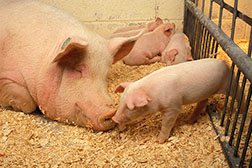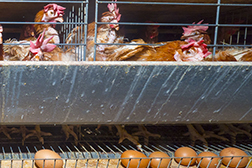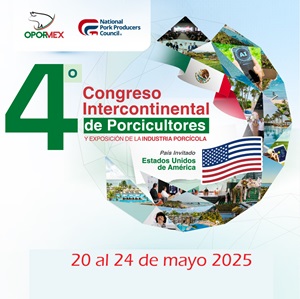El Servicio de Investigación Agrícola del USDA presenta la serie de seminarios web gratuitos, «Investigaciones para mitigar el impacto del estrés calórico en la salud y el bienestar de animales de producción.» Esta serie incluye tres seminarios web de 60 minutos que presentarán a científicos discutiendo investigaciones y prácticas sobre la mitigación del estrés térmico en el ganado, cerdos y las aves. Proporcionarán estrategias y recursos que pueden ayudar a mejorar la salud y el bienestar de los animales y ayudar a los productores a mejorar la eficiencia de la producción. El primer seminario será mañana a la 1pm hora de la Ciudad de México.
El seminario es en inglés.
Webinar Schedule
Webinars will run on July 27, August 3, and August 10, from 2:00 p.m. to 3:00 p.m. (EST). Preregistration is not required to attend.
For questions about the webinar series, please contact Maribel Alonso (Maribel.Alonso@usda.gov)
Session 1: Mitigating the Impacts of Heat Stress – Swine and Poultry
Date and time: Wednesday, July 27, 2022, 2:00 – 3:00 p.m. EST
Presentation: Improving Swine Heat Stress Resilience Through Management, Nutrition, and Genetics

Summary: Heat stress will become a more substantial issue for swine production as global temperatures continue to rise and is a limiting factor to efficient and sustainable swine production that must be addressed. This is especially true for heat stress sensitive populations such as gestating and lactating sows. A key aspect to mitigating heat stress-related health and welfare issues and production losses in swine may be developing better management approaches, nutritional strategies, and genetic selection techniques to improve heat stress resilience. As such, the USDA-ARS is focused on these three areas with the overreaching goal of improving swine heat stress resilience while maintaining or improving producer profitability.
Presenter: Dr. Jay Johnson, Research Animal Scientist, USDA-ARS Livestock Behavior Research, West Lafayette, IN
Dr. Jay Johnson is a Research Animal Scientist with the United States Department of Agriculture Agricultural Research Service in West Lafayette, IN specializing in stress and nutritional physiology. He received his Bachelor’s and Master’s degrees from the University of Missouri, his PhD from Iowa State University, and completed his postdoctoral training at Purdue University. The overall goal of Dr. Johnson’s research program is to identify production-relevant stressors and evaluate their impacts on livestock health, productivity, and welfare. Dr. Johnson’s research program uses an integrative physiology approach encompassing aspects of stress physiology, nutritional physiology, and ethology to develop and/or improve upon livestock husbandry practices that enhance animal health and welfare while maintaining or increasing economic return for producers. Specific areas of research include improving heat stress resilience in swine to reduce the negative effects of pre- and postnatal heat stress and mitigating the effects of early life stressors on gastrointestinal function in pigs and dairy calves to improve health, performance, and welfare metrics.
Presentation: Thermal Perches as Cooling Devices for Reducing Heat Stress in Caged Laying Hens

Summary: The webinar presents findings on the effects of chilled water-cooling perches on hen performance during hot temperatures, and physiological and behavioral parameters. In the study, 17-week-old White Leghorns were randomly assigned 1 of 3 treatments: cooled perch, air perch, and no perch. The results indicate that the cooled perches lessen the negative effects of heat stress on egg production, and physiological and behavioral responses. The system may be used as an alternative for reducing heat stress in poultry egg production, especially in the tropic and subtropic regions.
Presenter: Dr. Heng-Wei Cheng, Research Biologist, USDA-ARS Livestock Behavior Research West Lafayette, IN
Dr. Cheng received his M.D. from Medical School of Dongnan University, China and PhD from Wayne State University, Michigan. Dr. Cheng joined the faculty at the Harbin Medical University in 1979; and the faculty at the University of Southern California in 1989; and relocated his program to the USDA-ARS and Purdue University and began studying the mechanisms controlling stress response in poultry. He received PSA’s Poultry Welfare Research Award in recognition of his excellence in achievements in the research of poultry welfare in 2014. Dr. Cheng has educated over 40 individuals who hold positions at several universities and governments, and privately funded research environments. He has been PI or co-PI of some 13 federal grants worth over $5M and has published over 130 refereed publications in a variety of journals including Aggress Behav.; Behavioral Brain Research; Brain Research; Cells; Front. Genet; J. Comp. Neurol; J. Anim. Sci.; Neuroscience; Nutrition; Psychoneuroendocrinology; and Poultry Science.
Please click the link below to join the opening session on July 27
https://www.zoomgov.com/j/1613992050?pwd=aUhmZ2ZrL01ZM29oWmRKYUh1S0lOdz09



